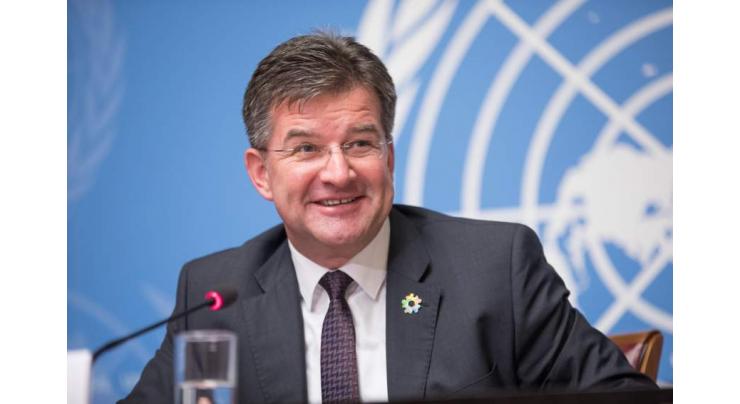
- Home
- World
- News
- Outgoing UNGA president calls for stepping up reform efforts to make Security Council more represent ..
Outgoing UNGA President Calls For Stepping Up Reform Efforts To Make Security Council More Representative
Mohammad Ali (@ChaudhryMAli88) Published September 15, 2018 | 12:29 AM

The outgoing UN General Assembly President, Miroslav Lajcak, has said that the process to reform the Security Council made some progress in the past year, as he urged member states to press on with their efforts to make the 15-member body more representative.
UNITED NATIONS, (APP - UrduPoint / Pakistan Point News - 14th Sep, 2018 ) :The outgoing UN General Assembly President, Miroslav Lajcak, has said that the process to reform the Security Council made some progress in the past year, as he urged member states to press on with their efforts to make the 15-member body more representative.
"It cannot be denied that the current composition of the UN Security Council is not representative because it does not reflect the realities of the 21st century. It copies the realities of 1945," Lajcak, who presided over the 72nd session of the 193-member, told his farewell press conference.
Lajcak said that calls for council reform are "just," and said the Council should reflect present day realities as he prepared to wind up his presidency next week, turning over the reigns to former Ecuadorian Foreign Minister Maria Fernanda Espinosa on September 18.
Despite a general agreement on enlarging the Council, as part of the UN reform process, member states remain sharply divided over the details.
Full-scale negotiations to restructure the Security Council began in the General Assembly in February 2009.
Known as the Group of Four India, Brazil, Germany and Japan have shown no flexibility in their campaign to expand the Security Council by 10 seats, with 6 additional permanent and four non-permanent members.
On the other hand, the Italy/Pakistan-led Uniting for Consensus (UfC) group opposes additional permanent members, saying it will not make the Security Council more effective and also undermine the fundamental principle of democracy that is based on periodic elections.
As a compromise, UfC has proposed a new category of members -- not permanent members -- with longer duration in terms and a possibility to get re-elected once.
The Security Council is currently composed of five permanent members -- Britain, China, France, Russia and the United States -- and 10 non-permanent members that are elected in groups of five to two-year terms.
Emphasizing the need for a reform, Lajcak, the outgoing General Assembly president, said that the inability of the Security Council to unite and act overshadows the positive work of the UN and the entire system "gets criticized harshly".
Therefore, the importance of the reform process "goes well beyond the role of the Security Council", he said.
Lajcak said that he had tried to ensure that the reform process was a credible one "and I think we succeeded on that".
"I think here, the views of different member states would differ," he conceded.
"For some, we went very far; for some others, this was not far enough." Lajcak appointed Ambassadors Kaha Imnadze of Georgia and Lana Nusseibeh of the United Arab Emirates as co-chairs of the Inter-governmental Negotiations to revitalize the process stalled for a decade.
Despite a universal acceptance of the need for change, the reform process faced practical issues "like, if expanded, to how many members? What about veto rights? What about permanent, non-permanent, semi-permanent?" But he added that the UN members "have to feel that the Security Council represents them all and they have to identify with the work of the Security Council.
"And this will not be the case for as long as there are important countries that believe that they are not adequately represented, or continents, and obviously starting with Africa." "The Member States have very clear, very strong positions, and many of them will make sure that this will not become a routine."
Related Topics
Recent Stories

PSX achieves significant milestone, surpasses 72,000 mark

Pak Vs NZ T20I: Orphaned children extended special invitation to watch match

Finance Minister lauds UNDP’s unwavering support during floods

President Raisi leaves for Iran from Karachi

Currency Rate In Pakistan - Dollar, Euro, Pound, Riyal Rates On 24 April 2024

Today Gold Rate in Pakistan 24 April 2024

Punjab CM inaugurates Pakistan’s first Virtual Women Police Station

Dutch model Donny Roelvink embraces Islam

Experts raise concerns over introduction of 10-stick packs

Iranian president arrives in Karachi

Law Minister expresses Govt's resolve to address issue of missing persons

Rizwan’s batting order may be changed: Sources
More Stories From World
-
'So hot you can't breathe': Extreme heat hits the Philippines
22 seconds ago -
In Tajikistan, climate migrants flee threat of fatal landslides
33 seconds ago -
Football: Italian Cup result
10 minutes ago -
Biden pledges swift weapons delivery to Ukraine
10 minutes ago -
China announces new partners for International Lunar Research Station
50 minutes ago -
Astronauts of China's Shenzhou-18 mission meet press
50 minutes ago
-
Partial power outage at Fukushima plant, water release suspended
50 minutes ago -
China renews blue alert for rainstorms
1 hour ago -
China's overnight Shibor interbank rate decreases Wednesday
1 hour ago -
Means of production prices mostly rise in China
1 hour ago -
China's Chang'e-7 lunar mission to carry instruments developed through int'l cooperation
1 hour ago -
Tokyo stocks end higher tracking Wall Street gains
1 hour ago